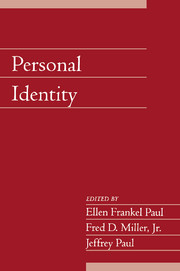Book contents
- Frontmatter
- Contents
- Introduction
- Acknowledgments
- Contributors
- Experience, Agency, and Personal Identity
- When Does a Person Begin?
- Persons, Social Agency, and Constitution
- Hylemorphic Dualism
- Personal Identity and Self-Ownership
- Self-Conception and Personal Identity: Revisiting Parfit and Lewis with an Eye on the Grip of the Unity Reaction
- The Normativity of Self-Grounded Reason
- Rationality Means Being Willing to Say You're Sorry
- Personal Identity and Postmortem Survival
- “The Thing I Am”: Personal Identity in Aquinas and Shakespeare
- Moral Status and Personal Identity: Clones, Embryos, and Future Generations
- The Identity of Identity: Moral and Legal Aspects of Technological Self-Transformation
- Index
Rationality Means Being Willing to Say You're Sorry
Published online by Cambridge University Press: 05 July 2014
- Frontmatter
- Contents
- Introduction
- Acknowledgments
- Contributors
- Experience, Agency, and Personal Identity
- When Does a Person Begin?
- Persons, Social Agency, and Constitution
- Hylemorphic Dualism
- Personal Identity and Self-Ownership
- Self-Conception and Personal Identity: Revisiting Parfit and Lewis with an Eye on the Grip of the Unity Reaction
- The Normativity of Self-Grounded Reason
- Rationality Means Being Willing to Say You're Sorry
- Personal Identity and Postmortem Survival
- “The Thing I Am”: Personal Identity in Aquinas and Shakespeare
- Moral Status and Personal Identity: Clones, Embryos, and Future Generations
- The Identity of Identity: Moral and Legal Aspects of Technological Self-Transformation
- Index
Summary
I. Introduction
This essay examines the problem of repentance and apology. What is so powerful about the three-word utterance, “I am sorry?” People who feel offended spend time and energy demanding an apology from the offender. People who have given offense often seem to have difficulty giving an apology. I want to ask two basic questions. What does a person really want when he asks for an apology? Why do people so often find it difficult to give an apology?
These questions may not seem to have anything to do with the issue of personal identity. But personal identity is relevant to repentance because one common difficulty with apologizing is that the person is reluctant to admit wrongdoing. The offender is willing to disrupt a relationship, bear costs himself and impose costs on others, rather than admit he did something wrong. Likewise, the victim is infuriated by the offender's failure to say, “I am sorry,” with sufficient sincerity. These are very curious behaviors. I believe that one explanation for these curious behaviors lies in a particular kind of self-understanding: the person identifies himself with his preferences and the behaviors that flow from them. In other words, the unrepentant soul has his own theory of personal identity, quite apart from anything any philosopher might have to say about it. The unrepentant person believes he is his preferences, and that he is entitled to the behavior that flows from those preferences.
- Type
- Chapter
- Information
- Personal Identity , pp. 204 - 225Publisher: Cambridge University PressPrint publication year: 2005



